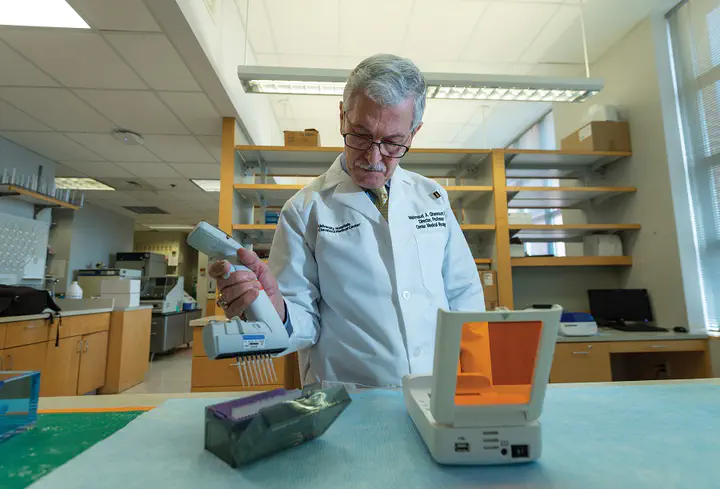 Professor Mahmoud Ghannoum
Professor Mahmoud GhannoumMahmoud Ghannoum is a professor and director of the Center for for Medical Mycology at Case Western Reserve University Hospitals Medical Center. He is also a cofounder of BIOHM, a company that carries out basic research on the human microbiome and has developed products to assess and support gut health.
The Ghannoum Laboratory, located at the Center for Medical Mycology (CMM), Department of Dermatology, School of Medicine at Case Western Reserve University, is well equipped to carry out various studies related to fungal pathogenesis. The laboratory has over 3,000 sq. ft. of space in the Biomedical Research Building and 2,000 sq. ft. on the 3rd floor of the Wearn Research Building at the Research Institute of University Hospitals Cleveland Medical Center. The laboratory is equipped with all necessary equipment to conduct experiments related to adhesion, filamentation, biofilm formation, and antimicrobial susceptibility testing. The laboratory is also CLIA- and CAP-approved and serves as a central lab for clinical trials involving acquisition and identification of clinical isolates of fungi and in vitro susceptibility testing of antifungal agents.
The Integrated Microbiome Core (IMC) at Case Western Reserve University aims to become a global leader in the study of bacterial and fungal communities as they relate to health and disease. The IMC differentiates itself by focusing on inter-kingdom interactions and identifying actionable steps that lead to the discovery of novel therapeutic and probiotic approaches. The IMC leverages the expertise of several faculty members in microbial pathogenesis, microbiome, mycobiome, bioinformatics, and immunological host response to provide the following services:
1. Transcriptional sequencing to support mycobiome and bacteriome scientific research
2. Integration with established CWRU SOM Cores to provide complementary services
3. Enhancement of microbiome transcriptional facilities and bandwidth currently in the CMM
4. Ongoing training for in-house laboratory staff in the use of these technologies and resources
5. Advanced microbiome transcriptome data analysis with systems biology approach and on-site scientists trained in these methods
6. Cutting-edge technology such as metabolomics to host-microbiome research with advanced analytical methods
7. Administrative and financial structure to oversee this cross-departmental interdisciplinary Core
The IMC also works closely with the Center for Medical Mycology (CMM) to provide a comprehensive suite of technologies for researchers interested in the micro- and myco-biomes. The IMC has a proven track record of establishing a Center of Excellence that attracts federal and industrial funding for over 20 years. Through the generation of preliminary microbiome data, the IMC has been successful in securing multiple federally funded grants in collaboration with other researchers at CWRU. The IMC has also secured industry funding in the past and is currently in the process of finalizing ongoing agreements with other sponsors.
Overall, the IMC’s expertise in microbial sequencing and its paradigm shifting work on the sequencing of fungal organisms of the body, coupled with its collaborations and funding track record, makes it a key player in the microbiome research space at CWRU.